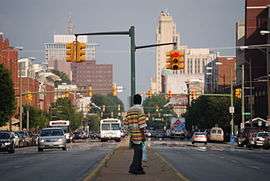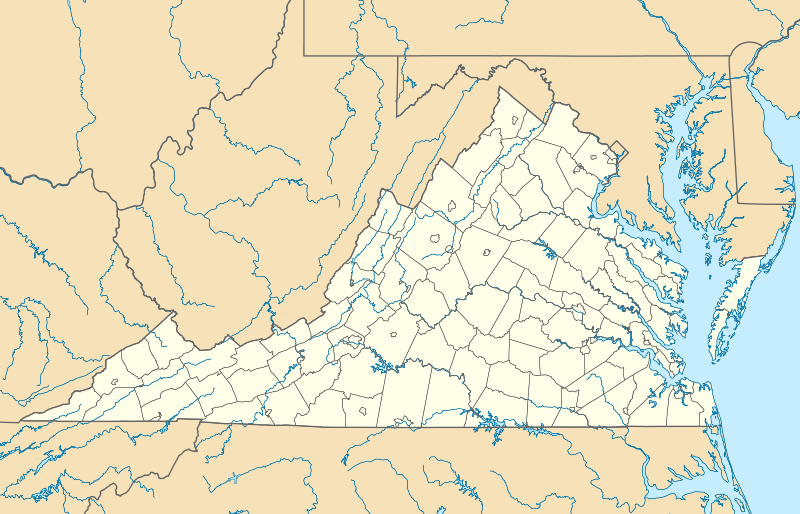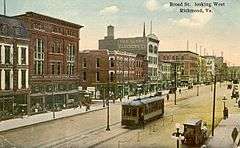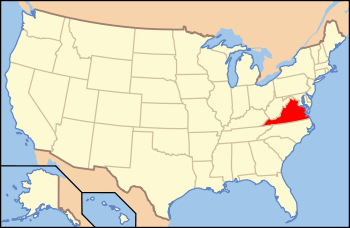Broad Street (Richmond, Virginia)

Broad Street is a 15-mile long road located in the independent city of Richmond, Virginia, and adjacent Henrico County. Broad Street is significant to Richmond due to the many commercial establishments that have been built along it throughout Richmond's history. From downtown through miles into the suburbs, the street is largely dedicated to retailing and offices, including regional and neighborhood shopping centers and malls.
Description
The east end of Broad Street is located at the northeastern edge of Chimborazo Park. It extends through Church Hill to Downtown Richmond. Also known as U.S. Route 250 west of Downtown Richmond, it extends west through Richmond's West End all the way to the outermost suburbs of Richmond just beyond Short Pump near the intersection of I-295 and I-64.
Continuing west into Goochland County Broad Street becomes Broad Street Rd. U.S. Route 250; the road extends all the way to Sandusky, OH.
History and development
Downtown
|
Broad Street Commercial Historic District | |
|
Postcard View of Broad Street, looking South, at 7th and Broad Streets. Note the Streetcars. | |
  | |
| Location | Along Broad St. area roughly bounded by Belvidere, Marshall, Fourth and Grace, Richmond, Virginia |
|---|---|
| Coordinates | Coordinates: 37°32′45″N 77°26′35″W / 37.54583°N 77.44306°W |
| Area | 29 acres (12 ha) |
| Architectural style | Classical Revival, Italianate |
| NRHP Reference # |
87000611 (original) 04000851 (increase 1) 07000219 (increase 2) |
| VLR # | 127-0375 |
| Significant dates | |
| Added to NRHP | April 09, 1987[1] |
| Boundary increases |
August 11, 2004 March 27, 2007 |
| Designated VLR | October 14, 1986[2] |
Broad Street connects many historical sites in Downtown Richmond. It is home to the lavish Empire Theatre,[3] which is the state's oldest operating theatre. Theatre IV, the Children's Theatre of Virginia, the second largest children's theatre in the nation, owns the Empire and presents its mainstage season there in downtown Richmond. Until the late 19th century, the trains of the Richmond, Fredericksburg and Potomac Railroad ran down the center of the street from the present Harrison Street east to Eighth Street. The area around Sixth and Broad Streets was the center of retailing in the Southeast, with department stores such as Miller & Rhoads, Thalhimers, G. C. Murphy, Woolworth, Raylass, Sears, Cohen's and W. T. Grant and niche retailers like Hofheimer's. It was also home to "theater row", which included venues such as the National.[4][5][6]
It has also been the site of major institutional structures, including Monumental Church, the Library of Virginia, the present and former city halls, and the Virginia Department of Transportation headquarters.
In 1919, the Richmond, Fredericksburg and Potomac Railroad relocated its terminal to the more suburban Broad Street Station.
West End
As Richmond moved westward, so did the retail district. Miles away, Short Pump Town Center in western Henrico County on Broad Street has leading retailers including Macy's, Dillard's and Nordstrom.
See also
| Wikimedia Commons has media related to Broad Street, Richmond, Virginia. |
References
- ↑ National Park Service (2009-03-13). "National Register Information System". National Register of Historic Places. National Park Service.
- ↑ "Virginia Landmarks Register". Virginia Department of Historic Resources. Retrieved 19 March 2013.
- ↑ http://cinematreasures.org/theaters/11510
- ↑ Robert P. Winthrop (September 1986). "National Register of Historic Places Inventory/Nomination: Broad Street Commercial Historic District" (PDF). Virginia Department of Historic Resources. and Accompanying four photos and Accompanying map
- ↑ Nancy W. Kraus (n.d.). "National Register of Historic Places Inventory/Nomination: Broad Street Commercial Historic District (2004 Increase)" (PDF). Virginia Department of Historic Resources.
- ↑ Kimberly M. Chen and Hannah W. Collins (June 2006). "National Register of Historic Places Inventory/Nomination: Broad Street Commercial Historic District (2007 Increase)" (PDF). Virginia Department of Historic Resources.


